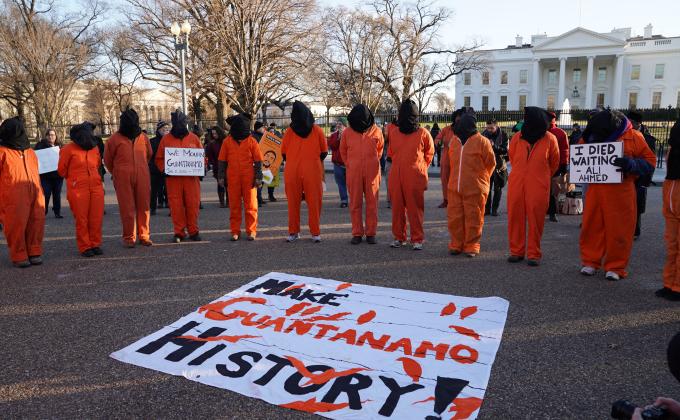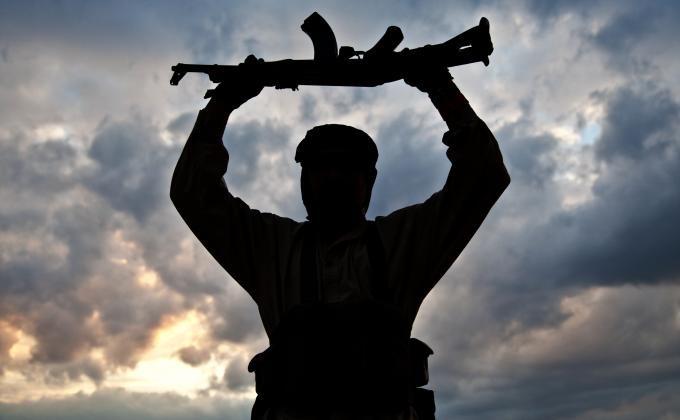In 2013, four young British men from West London travelled to Syria to join ISIS. Dubbed ‘The Beatles’ by their hostages, and subsequently the global media, this British ISIS cell allegedly became responsible for at least twenty-seven beheadings of Western hostages. Six years have since gone by and despite their capture the remaining two members of the Beatles have still not been brought to justice. Last week the US Attorney General William Barr sent a letter to the UK Home Secretary assuring that the death penalty will not be pursued against the Beatles, once again bringing the Beatles to the forefront of policy debates on the international response to returning foreign fighters. This op-ed explores the main legal challenges and assesses where is most suitable for the Beatles to be brought to justice for the crimes they have committed.
So who are the Beatles members?
The cell’s most notorious member, Mohammed Emwazi (also known as Jihadi John), appeared in several online videos which depicted the beheading of Western hostages. Emwazi was killed in a US drone strike at the end of 2015. The second member Aine Davis, who already had a record of previous convictions for drugs and weapons possession, was convicted in 2017 in Turkey for membership of a terrorist organisation.
The two remaining members of the Beatles cell, El Shafee Elsheikh and Alexanda Amon Kotey were captured early in 2018 by the Kurdish-led Syrian Democratic Forces (SDF) and transferred to US custody in Iraq prior to the Turkish invasion in January 2019. Elsheikh and Kotey, are the last two remaining members of the infamous Beatles cell and are designated by the US as terrorists.
Deprivation of nationality
Both Elsheikh and Kotey were deprived of their British citizenship in 2018 after the UK decided that they pose a threat to national security. They are just two of nearly 120 persons that the UK has stripped of their nationality since 2016 in the name of counter-terrorism and protecting national security, according to figures from February 2019. Under the 1961 Convention on the Reduction of Statelessness all States should avoid stripping nationality where the measure would lead to statelessness, but the Convention does allow, in article 83(b)(ii), for the possibility of deprivation of nationality on limited grounds even if this leaves the person concerned stateless. The UK has made a declaration to retain the right to deprive a naturalised person of his nationality where it is deemed by the Home Secretary to be conducive to the public good. These powers have been continually expanded since 2006 and now allow for the deprivation of nationality even where this would lead to statelessness. The most recent and controversial case is that of Shamima Begum.
MLA request
As early as June 2015, the US made a mutual legal assistance (MLA) request to the UK for information on Eisheikh and Kotey. Having long been a member of the EU, the UK has ratified Protocol 6 and Protocol 13 to the European Convention on Human Rights abolishing the death penalty and thus has a longstanding policy not to extradite persons or share information through an MLA that could lead to the death penalty. Article 94 of the Extradition Act 2003 specifically states that the Secretary of State must not order an extradition if a person could be sentenced to death, unless written assurances are given that the death penalty will not be imposed or carried out. The MLA guidelines also specifically stipulate that the risk of an imposition of the death penalty would be against the public policy doctrine of the UK and ground for refusal.
When determining whether or not to comply with the MLA request of the US without death penalty assurances, several factors were taken into account. The UK strongly believed that the evidence requested was vital for successful prosecution of Kotey and Elsheikh in the US. Also considered was the risk that death penalty assurances may result in a lack of evidence required for a criminal prosecution in civilian courts in the US, and could lead to the transfer of both men to Guantanamo Bay, which the UK strongly opposes. Sending the Beatles to Guantanamo should be avoided under any circumstance since it opens a whole range of fair trial issues, potentially preventing a trial before a civilian court.
Considering the obligation to bring foreign terrorist fighters to justice, and despite the long-standing policy of the UK on the death penalty, the Home Secretary acceded to the MLA request without any death penalty assurances. Ultimately, the Home Secretary authorised disclosure of a portion of the evidence requested by the US, sharing a selection of 600 witness statements. When this became public, the mother of Elsheikh, Maha Elgizouli, challenged the decision of the Home Secretary, gaining an injunction which barred the sharing of any further evidence until the matter was heard in Court. When the High Court dismissed the case, she took the matter to the Supreme Court.
The ruling of the Supreme Court
The Supreme Court ruled on 25 March 2020 on two questions: (i) whether it is unlawful for the Secretary of State to exercise his power to grant an MLA request that could lead to the imposition of the death penalty and (ii) whether it is lawful under the Data Protection Act 2018 (‘DPA’), for law enforcement authorities in the UK to transfer personal data to law enforcement authorities abroad for use in capital criminal proceedings.
On the first question, the Supreme Court ruled that there is “as yet no established principle (under the common law, the European Convention or any other recognised system of law), which prohibits the sharing of information relevant to a criminal prosecution in a non-abolitionist country merely because it carries a risk of leading to the death penalty in that country. [191]”. This decision in itself merits a separate discussion on whether there is or should be a rule preventing sharing of evidence that could lead to the death penalty, but it is interesting to note that some family members of the victims have spoken out against the death penalty.
On the second question all the Justices unanimously, but for distinct reasons, concluded that the conditions surrounding the transfer of the data to the US were not met and the transfer constitutes a breach of the DPA Act, which implements Law Enforcement Directive (Directive (EU) 2016/680). Any transfer of personal data must be necessary for law enforcement purposes and the transfer must be based on (a) an adequacy decision, (b) if not based on (a), then based on there being appropriate safeguards, or (c) if not based on (a) or (b) then based on special circumstances. In this case the transfer is not based on an adequacy decision nor have appropriate safeguards been taken.
The MLA request has been partially granted without any death penalty assurances, the exact type of safeguards which are specifically mentioned in section 71 of the EU Directive which stipulates that “personal data will not be used to request, hand down or execute a death penalty or any form of cruel and inhuman treatment.” It thus appears that an MLA without death penalty assurances would only be possible if special circumstances apply. The Home Secretary did not carry out a specific assessment, nor do Kotey and Elsheikh pose an immediate threat to public security, making the transfer of evidence to the US unlawful. Although the decision of the Supreme Court is final, a hearing date needs to be set to decide what remedial order should be imposed.
The letter of Attorney General William Barr also indicated that neither earlier information nor any subsequent information obtained through the MLA be shared with other countries that may pursue or impose the death penalty, paving the path to bringing the Beatles to justice.
Where can the Beatles members be prosecuted?
Clearly the US wants to prosecute the Beatles, they have been requesting evidence from the UK since 2015. One option open to the US to achieve this would be to assert jurisdiction on the basis of the nationality of the victims (the passive nationality principle).
In an op-ed in the Washington Post, four parents of US victims James Foley, Peter Kassig, Kayla Mueller and Steven Sotloff pleaded to the US to hold Kotey and Elsheikh accountable for the crimes they have committed but objected to detention without trial. The extent to which this op-ed has contributed to a change of policy is difficult to say, although the US National Security Council and Department of Justice met just days after the op-ed to discuss the different options including the earlier options of sending the Beatles to Guantanamo Bay, transferring custody to Iraq, reconsidering whether the prosecution for capital crimes could take place without the evidence of the UK, and providing death penalty assurances for the MLA request. The US prosecutor’s stance is that they will be tried for terrorist crimes and that the requested evidence should be shared promptly as any further delay would do injustice to the family. However, the US placed a time-bar to the MLA request which warns that if the information is not received by 15 October 2020, then Kotey and Elsheikh will be transferred to the Iraqi authorities.
This raises the next question: can the remaining Beatles be prosecuted in Iraq? The available information suggests that the men only carried out their heinous crimes in Syria and not in Iraq. If neither of the perpetrators nor victims were Iraqi nor any crimes were committed in Iraqi territory, Iraq would only be able to prosecute on the basis of universal jurisdiction. Some of the crimes committed by the Beatles amount to war crimes such as hostage taking, torture, rape and beheadings in videos and Kotey and Elsheikh have implicated themselves in some of these crimes during interviews.
An earlier perspective explains however that Iraq has not criminalised international crimes in their national laws and therefore Iraqi courts cannot try international crimes that have been committed. Only if torture took place in Iraq would Iraq, under the Convention against Torture, be under the obligation to establish necessary jurisdiction and prosecute the torture committed on their territory. So, it is unlikely that Elsheikh and Kotey can be prosecuted in Iraq for international crimes, at the very most they could be prosecuted for terrorist offences. Amnesty International questioned to capability of the Iraqi courts to deliver justice for ISIS fighters since they have on several occasions sentenced foreign fighters to death in trials that barely last ten minutes and often rely on confessions obtained through torture.
Another possibility is Japan since the Beatles also killed two Japanese journalists: Haruna Yukawa and Kenji Goto. According to article 3(2) and 4(2), Japan could prosecute Kotey and Elsheikh for some of the alleged crimes such as torture and kidnapping for ransom committed against Japanese victims abroad, the former of which could also be prosecuted by Japan under Article 5c of the Convention against Torture. The main issue is whether there is willingness and enough evidence for Japan to prosecute these men.
This leaves us with the UK. The fact that the UK has deprived the men of their nationality would mean that that UK courts would not be able to prosecute them on the basis of active nationality, although this point is contentious since the men still had active British nationalities at the time they committed the crimes. It was, however, at this time the stance of the British government that the evidence available was not evidence enough for a prosecution for the crimes in question. Yet this same evidence is considered so vital that without it the US may not be able to prosecute the last two remaining Beatles.
The UK’s assessment of the strength of the available evidence has been strongly criticised, including by a former Director of Public Prosecutions, who has refuted that there was insufficient evidence for the UK to pursue prosecution instead of letting the US try the Beatles. In fact, Kotey had already been charged with multiple murders and hostage-taking in February 2016. The UK, like many other European countries, is reluctant to take back their own foreign fighters out of fear for lenient sentences, misplaced security concerns, and lack of political support.
What next?
It remains a matter of time to see how the fate of the Beatles will unfold. This case has attracted a lot of media attention with nearly six years having gone by without the Beatles being prosecuted. The families of the victims, but also the parents of Kotey and Elsheikh, have on numerous occasions spoken about the crimes that the Beatles have committed and the need for them to be brought to justice. Kotey and Elsheikh have also given numerous interviews. The only proper outcome is for these men to be tried before a court of law and not to be tried by and before the media.
Muscle flexing by the US to impose strict deadlines to share evidence may not be helpful, but the UK should take its responsibility seriously and either prosecute the Beatles or, in light of the assurances offered by the US, share evidence with the US without further delay. The US and UK should no longer pay lip service to providing justice to the victims, but work together to ensure that the Beatles will finally face justice through a fair trial. The Beatles should be tried for the actual crimes they have committed, and if permitted by law, victims should be provided a chance to be heard during the trial. This would be the only way that justice can be served.
This publication represents the views of the author(s) solely. ICCT is an independent foundation, and takes no institutional positions on matters of policy unless clearly stated otherwise.
Photocredit: Daniel_Kay/Shutterstock








